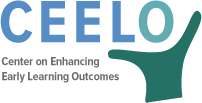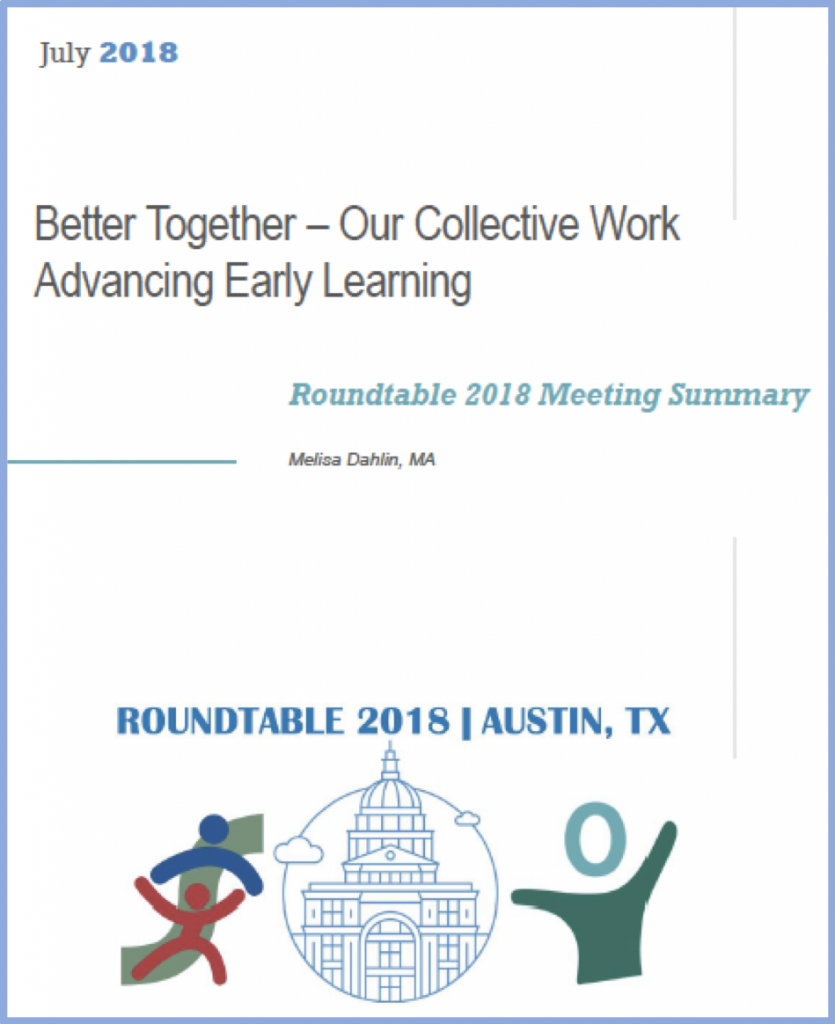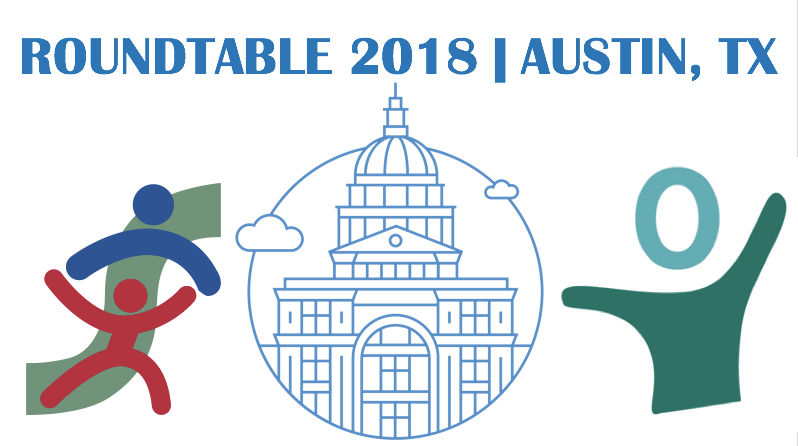
BETTER TOGETHER – 2018 Roundtable Meeting Summary
The Roundtable is collaboratively planned by NAECS-SDE and CEELO with national technical assistance partners to build capacity of state agency early childhood specialists to provide informed leadership about research-based practices that directly impact the development and learning of children, birth through grade three. The meeting provides participants with cutting edge research and innovative proven practices to enhance state policies and programs.
Better Together – Our Collective Work Advancing Early Learning
PURPOSE – Build the capacity of participants to provide informed leadership and research-based policy and practice in support of effective high performing systems for children birth through grade three
OUTCOMES — As a result of this meeting, state early childhood education administrators will increase –
CONTENT KNOWLEDGE IN:
- Workforce development;
- ESSA early learning opportunities;
- Instructional improvement birth through 3rd grade;
- Equitably addressing the learning needs of all children.
SKILLS AND COMPETENCIES IN:
- Systems thinking and alignment;
- Implementing for continuous improvement;
- Collective impact in high performing offices of early learning;
- Leading to results.
 Carey M. Wright, Ed.D. – Mississippi State Superintendent of Education – Dr. Carey M. Wright became the State Superintendent of Education for Mississippi in 2013. Under her leadership, Mississippi has initiated aggressive education reforms that have increased literacy skills in pre-K through the 3rd grade, pushed student achievement on the National Assessment of Educational Progress (NAEP) to improve at a faster rate than most other states, and increased the graduation rate to an all-time high of 83 percent. Dr. Wright spearheaded initiatives in Mississippi that nearly doubled the Advancement Placement (AP) participation and success rate, resulted in significant annual gains in English Language Arts and Mathematics proficiency, and earned Mississippi recognition from the National Institute for Early Education Research (NIEER) as one of the top six states in the nation for providing high-quality early childhood education. Dr. Wright previously served as the Chief Academic Officer and the Deputy Chief for the Office of Teaching and Learning for the District of Columbia Public Schools and as the Associate Superintendent for the Office of Special Education and Student Services for the Montgomery County Public Schools in Maryland. Dr. Wright spent the majority of her career in Howard County Public Schools as a teacher, a principal, and the Director of Special Education and Student Services. She began her career as a teacher in Prince George’s County Public Schools in Maryland. Dr. Wright has been recognized as an outstanding educator by the National Center for Culturally Responsive Systems, nominated twice for The Washington Post Outstanding Principal Award, and awarded the Howard County Chamber of Commerce Outstanding Educator of the Year. She is president of the Board of Directors of the Council of Chief State School Officers where her President’s Initiative focuses on advancing early childhood education. Dr. Wright obtained her bachelor, master, and doctoral degrees from the University of Maryland, College Park.
Carey M. Wright, Ed.D. – Mississippi State Superintendent of Education – Dr. Carey M. Wright became the State Superintendent of Education for Mississippi in 2013. Under her leadership, Mississippi has initiated aggressive education reforms that have increased literacy skills in pre-K through the 3rd grade, pushed student achievement on the National Assessment of Educational Progress (NAEP) to improve at a faster rate than most other states, and increased the graduation rate to an all-time high of 83 percent. Dr. Wright spearheaded initiatives in Mississippi that nearly doubled the Advancement Placement (AP) participation and success rate, resulted in significant annual gains in English Language Arts and Mathematics proficiency, and earned Mississippi recognition from the National Institute for Early Education Research (NIEER) as one of the top six states in the nation for providing high-quality early childhood education. Dr. Wright previously served as the Chief Academic Officer and the Deputy Chief for the Office of Teaching and Learning for the District of Columbia Public Schools and as the Associate Superintendent for the Office of Special Education and Student Services for the Montgomery County Public Schools in Maryland. Dr. Wright spent the majority of her career in Howard County Public Schools as a teacher, a principal, and the Director of Special Education and Student Services. She began her career as a teacher in Prince George’s County Public Schools in Maryland. Dr. Wright has been recognized as an outstanding educator by the National Center for Culturally Responsive Systems, nominated twice for The Washington Post Outstanding Principal Award, and awarded the Howard County Chamber of Commerce Outstanding Educator of the Year. She is president of the Board of Directors of the Council of Chief State School Officers where her President’s Initiative focuses on advancing early childhood education. Dr. Wright obtained her bachelor, master, and doctoral degrees from the University of Maryland, College Park.
L ibby Doggett has devoted 40 plus years to work in schools, Head Start and child care with children with, and without disabilities. She has built public will and strong diverse coalitions around the country and in Texas to improve children’s readiness for kindergarten and beyond. Before returning to Austin, Doggett served as President Obama ‘s appointee to the US Department of Education overseeing and expanding early learning programs across the country. In Washington, Libby also worked previously with the Pew Charitable Trusts and the National Head Start Association heading up national campaigns to improve children’s access to and the quality of early childhood education programs. She began her career as a bilingual first grade teacher at Ortega Elementary School in Austin, and holds a doctorate from the University of Texas in early childhood special education.
ibby Doggett has devoted 40 plus years to work in schools, Head Start and child care with children with, and without disabilities. She has built public will and strong diverse coalitions around the country and in Texas to improve children’s readiness for kindergarten and beyond. Before returning to Austin, Doggett served as President Obama ‘s appointee to the US Department of Education overseeing and expanding early learning programs across the country. In Washington, Libby also worked previously with the Pew Charitable Trusts and the National Head Start Association heading up national campaigns to improve children’s access to and the quality of early childhood education programs. She began her career as a bilingual first grade teacher at Ortega Elementary School in Austin, and holds a doctorate from the University of Texas in early childhood special education.
 Jacquie Porter is the Statewide Director of Early Childhood for the Texas Education Agency (TEA). Jacquie has been with the TEA for six months and is focused on implementing initiatives committed to technical assistance, public and private partnerships between child care centers and school districts/charter schools and family engagement. Prior to her current position at the agency, Jacquie served as the Director of Early Childhood for the Austin Independent School District for 9 ½ years where she was responsible for the 3PK, Prekindergarten and Kindergarten programs for the district. During her tenure with Austin ISD, Jacquie helped orchestrate collaborations between child development centers and the school district to increase access for families, opened the three-year-old prekindergarten program and a program for tuition based students. She has taught Prekindergarten, Multi-age prekindergarten/kindergarten, Kindergarten Readiness, Kindergarten and First Grade. Jacquie has also served Austin ISD as a Primary Literacy Specialist and led the Response to Intervention (RTI) program. She has presented various professional development workshops in Austin, throughout the state of Texas and across the nation. Mrs. Porter has been recently awarded a Butler award in 2018 and her achievements recognized by the City of Austin during Jacquie Porter Day in December of 2017. As the Statewide Director of Early Childhood, Jacquie enjoys working with the wonderfully talented and dedicated early childhood teachers across the state and the incredible advocates for young children in Texas.
Jacquie Porter is the Statewide Director of Early Childhood for the Texas Education Agency (TEA). Jacquie has been with the TEA for six months and is focused on implementing initiatives committed to technical assistance, public and private partnerships between child care centers and school districts/charter schools and family engagement. Prior to her current position at the agency, Jacquie served as the Director of Early Childhood for the Austin Independent School District for 9 ½ years where she was responsible for the 3PK, Prekindergarten and Kindergarten programs for the district. During her tenure with Austin ISD, Jacquie helped orchestrate collaborations between child development centers and the school district to increase access for families, opened the three-year-old prekindergarten program and a program for tuition based students. She has taught Prekindergarten, Multi-age prekindergarten/kindergarten, Kindergarten Readiness, Kindergarten and First Grade. Jacquie has also served Austin ISD as a Primary Literacy Specialist and led the Response to Intervention (RTI) program. She has presented various professional development workshops in Austin, throughout the state of Texas and across the nation. Mrs. Porter has been recently awarded a Butler award in 2018 and her achievements recognized by the City of Austin during Jacquie Porter Day in December of 2017. As the Statewide Director of Early Childhood, Jacquie enjoys working with the wonderfully talented and dedicated early childhood teachers across the state and the incredible advocates for young children in Texas.
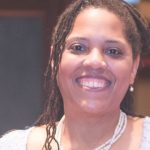 Cheryl Mixon is the Executive Director of Early Learning in Fort Worth Independent School District (FWISD). In this role, Dr. Mixon leads the department that guides early learning instructional practices for Pre-Kindergarten through second grade. The focus of her work is to align the early learning grades to better serve young children. Previously, Dr. Mixon was an assistant professor in the Child and Family Studies program at Tarleton State University. Dr. Mixon completed her Ph.D. at Texas Woman’s University in Early Child Development and Education. She earned her M.Ed. from Texas Christian University and her B.S. from Louisiana State University. Dr. Mixon began her career as an early childhood teacher in FWISD and has maintained her commitment to quality early education for all children. Her interests include early childhood mathematics and social/emotional development in young children. She has conducted research in preschool math instructional practices, math talk and home numeracy.
Cheryl Mixon is the Executive Director of Early Learning in Fort Worth Independent School District (FWISD). In this role, Dr. Mixon leads the department that guides early learning instructional practices for Pre-Kindergarten through second grade. The focus of her work is to align the early learning grades to better serve young children. Previously, Dr. Mixon was an assistant professor in the Child and Family Studies program at Tarleton State University. Dr. Mixon completed her Ph.D. at Texas Woman’s University in Early Child Development and Education. She earned her M.Ed. from Texas Christian University and her B.S. from Louisiana State University. Dr. Mixon began her career as an early childhood teacher in FWISD and has maintained her commitment to quality early education for all children. Her interests include early childhood mathematics and social/emotional development in young children. She has conducted research in preschool math instructional practices, math talk and home numeracy.
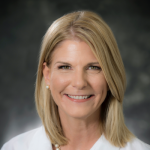 Sarah Baray is Chief Executive Officer of Pre-K 4 SA (San Antonio). She joined Pre-K 4 SA in 2016 bringing more than 25 years of education experience to the program. Before joining Pre-K 4 SA, Dr. Baray was a professor at Texas State University where she directed the Ph.D. in School Improvement program and served as a researcher and instructor in the Educational and Community Leadership program. Prior to Texas State, Dr. Baray worked in the Austin Independent School District, serving in various roles including teacher, principal, and district administrator. Dr. Baray holds a Ph.D. in Executive Public School Leadership from the University of Texas at Austin. Her research interests center on policies and practices related to educational equity. As a scholar-practitioner, Dr. Baray conducts studies to inform practice. Drawing from her research on educator beliefs about students of diverse backgrounds, Dr. Baray provides professional development to help educators become more culturally responsive. She has authored dozens of articles and book chapters and makes presentations to both researchers and practitioners.
Sarah Baray is Chief Executive Officer of Pre-K 4 SA (San Antonio). She joined Pre-K 4 SA in 2016 bringing more than 25 years of education experience to the program. Before joining Pre-K 4 SA, Dr. Baray was a professor at Texas State University where she directed the Ph.D. in School Improvement program and served as a researcher and instructor in the Educational and Community Leadership program. Prior to Texas State, Dr. Baray worked in the Austin Independent School District, serving in various roles including teacher, principal, and district administrator. Dr. Baray holds a Ph.D. in Executive Public School Leadership from the University of Texas at Austin. Her research interests center on policies and practices related to educational equity. As a scholar-practitioner, Dr. Baray conducts studies to inform practice. Drawing from her research on educator beliefs about students of diverse backgrounds, Dr. Baray provides professional development to help educators become more culturally responsive. She has authored dozens of articles and book chapters and makes presentations to both researchers and practitioners.
 Andres Bustamante is a Postdoctoral Research Fellow under the Institute of Education Sciences “Network for Integrating Cognitive and Educational Sciences (NICE) Postdoctoral Research Training Grant Program.” He has a dual appointment in the Department of Psychology and the College of Education under the mentorship of Dr. Kathy Hirsh-Pasek and Dr. Annemarie Hindman. He earned a bachelor’s degree in developmental psychology from Emmanuel College, as well as a master’s degree and Ph.D. in developmental psychology from the University of Miami under the mentorship of Dr. Daryl Greenfield. His research focuses on early childhood science as an ideal context for fostering domain general learning skills like approaches to learning, executive functioning, and social emotional development. With Dr. Hirsh-Pasek, his focus has been on translating his research from the classroom to the community through the learning landscapes projects (e.g. a life-sized board game installed in parks targeting STEM and reasoning skills).
Andres Bustamante is a Postdoctoral Research Fellow under the Institute of Education Sciences “Network for Integrating Cognitive and Educational Sciences (NICE) Postdoctoral Research Training Grant Program.” He has a dual appointment in the Department of Psychology and the College of Education under the mentorship of Dr. Kathy Hirsh-Pasek and Dr. Annemarie Hindman. He earned a bachelor’s degree in developmental psychology from Emmanuel College, as well as a master’s degree and Ph.D. in developmental psychology from the University of Miami under the mentorship of Dr. Daryl Greenfield. His research focuses on early childhood science as an ideal context for fostering domain general learning skills like approaches to learning, executive functioning, and social emotional development. With Dr. Hirsh-Pasek, his focus has been on translating his research from the classroom to the community through the learning landscapes projects (e.g. a life-sized board game installed in parks targeting STEM and reasoning skills).
 Steve Barnett is Director of NIEER and Principal Investigator at CEELO. Steve is a Board of Governors Professor and Director of the National Institute for Early Education Research (NIEER) at Rutgers University. His research includes studies of the economics of early care and education including costs and benefits, the long-term effects of preschool programs on children’s learning and development, and the distribution of educational opportunities. Dr. Barnett earned his Ph.D. in economics at the University of Michigan. He has authored or co-authored over 180 publications. Research interests include the economics of human development and practical policies for translating research findings into effective public investments. His best known works include: reviews of the research on long-term effects; benefit-cost analyses of the Perry Preschool and Abecedarian programs; randomized trials comparing alternative approaches to educating children including length of day,monolingual versus dual-language immersion, the Tools of the Mind curriculum; and, the series of State Preschool Yearbooks providing annual state-by-state analyses of progress in public pre-K.
Steve Barnett is Director of NIEER and Principal Investigator at CEELO. Steve is a Board of Governors Professor and Director of the National Institute for Early Education Research (NIEER) at Rutgers University. His research includes studies of the economics of early care and education including costs and benefits, the long-term effects of preschool programs on children’s learning and development, and the distribution of educational opportunities. Dr. Barnett earned his Ph.D. in economics at the University of Michigan. He has authored or co-authored over 180 publications. Research interests include the economics of human development and practical policies for translating research findings into effective public investments. His best known works include: reviews of the research on long-term effects; benefit-cost analyses of the Perry Preschool and Abecedarian programs; randomized trials comparing alternative approaches to educating children including length of day,monolingual versus dual-language immersion, the Tools of the Mind curriculum; and, the series of State Preschool Yearbooks providing annual state-by-state analyses of progress in public pre-K.
These webinars are planned in advance of the 2018 Roundtable Meeting and designed to deliver expert content before the meeting to participants. As the date approaches, additional information on the panel presenters and recommended readings will be sent to webinar registrants on this topics. Anyone interested is welcome to register for these webinars.
Early Learning Opportunities in the Every Student Succeeds Act (ESSA)
This webinar, recorded on April 26, 2018, provides an overview of the early learning opportunities in the Every Student Succeeds Act (ESSA) focusing on the lessons from the CEELO-CCSSO policy brief reviewing plans approved by USED, The State of Early Learning in ESSA: Plans and Opportunities for Implementation. Presenters focused on three key priorities for early learning in ESSA: 1) setting clear goals and policy priorities for early learning; 2) integrating early learning into school improvement; and, 3) supporting early childhood educator development.
Panelists:
- Rolf Grafwallner, CCSSO’s Program Director of Early Childhood Education, moderator
- Kimberly Krzanowski-Executive Director of the Office of Early Learning at the Delaware Department of Education
- Cindy Koss-Deputy Superintendent for Academic Affairs and Planning and Sharon Morgan-Director of Early Childhood, both at the Oklahoma State Department of Education
- Elizabeth Alves-Assistant Commissioner for Early Learning and Literacy at the Tennessee Department of Education
High-Quality Instruction – Birth Through Third Grade
Panelists discuss what constitutes high-quality instruction in the early grades. This webinar addresses multiple perspectives, including addressing the following questions:
- What does RIGOR look like in the context of play-based learning?
- How do state agency personnel support district leaders and schools in optimizing curricula and environments for students from preschool through third grade?
- How do district personnel and teachers effectively implement high-quality curriculum for children from preschool through grade three?
Listeners have a chance to learn from a national expert, state agency personnel, district leaders, and teachers working on issues of high-quality instruction.
- Diane Schilder, CEELO Senior Research Scientist at EDC, moderator
- Andres Bustmante, Post-Doctoral Research Fellow, Temple University
- Jane Fronheiser and Tina Rose-Turriglio, New York State Education Department
- Peg Drappo, Tracy Kriegsbaum, Renee Waterbury and Heather White, Watertown City School District, NY
Equitable Early Learning for All Children
This webinar was discussion based and focused on several readings and previously occurring webinars. It began with a viewing of a previously recorded EDtalk by Jennifer Adair, followed by discussion and Q & A.
Jennifer Keys Adair, PhD is Associate Professor of Early Childhood Education at The University of Texas at Austin. Her work focuses on the connection between agency and discrimination in the early learning experiences of children of immigrants. As a young scholar fellow with the Foundation of Child Development and a major grant recipient of the Spencer Foundation, Dr. Adair is working with parents, teachers, administrators and young children to improve the learning experiences of young children from marginalized communities. Her areas of expertise include early childhood education, children of immigrants’ schooling experiences, immigrant parent engagement, project based learning and the importance of young children exploring racial and cultural differences.
Watch the EDtalk here (start at 5-minutes and continue to 42:30-minutes).
Advancing the Workforce Teaching Birth Through Third Grade
Participants on this webinar heard from Albert Wat (Alliance for Early Success) and Debra Adams (Connecticut) on their reflections on NAM’s Transforming the Workforce Initiatives, along with Linda Bray and Susan Sarver (Nebraska) on their state implementation efforts transforming the workforce. After, Laura Bornfreund and Abbie Lieberman provided an online tour of New America’s guidebook to the report’s findings.
See the resources shared during the webinar:
- Transforming Early Childhood Care and Education Highlights from Two Reports
- A Unified Foundation to Support a Highly Qualified Early Childhood Workforce
- Early Childhood Workforce Commission Overview – Buffett Institute at the University of Nebraska
- New America Foundation’s Multimedia Guidebook to Transforming the Early Education Workforce
The following resources are recommended readings prior to arrival in Austin. Although, they are divided by cohort topic area they are relevant to all participants.
Early Learning Opportunities in the Every Student Succeeds Act (ESSA)
- The State of Early Learning in ESSA: Plans and Opportunities for Implementation
- Birth to Grade 3 Indicator Framework: Opportunities to Integrate Early Childhood in ESSA CCSSO CEELO Toolkit
- Every Student Succeeds Act: Guiding LEA Needs Assessments and Plan Development to Consider Early Learning
High-Quality Instruction – Birth Through Third Grade
- PK-3: What Does It Mean for Instruction?
- Early Childhood Preparation for School Leaders: Lessons from New Jersey Principal Certification Programs
- Extracting Success in Pre-K Teaching: Approaches to Effective Professional Learning Across Five States
Equitable Early Learning for All Children
- Equity Starts Early
- Addressing the African American Achievement Gap: Three Leading Educators Issue a Call to Action
- YB Special Report: Supporting Dual Language Learners in State-Funded Preschool
Advancing the Workforce Teaching Birth Through Third Grade
- Feedback from the National Association of Early Childhood Specialists in State Departments of Education (NAECS-SDE) to NAEYC Power to the Profession Decision Cycles 3, 4, & 5
- A Unified Foundation to Support a Highly Qualified Early Childhood Workforce
- New America Foundation’s Multimedia Guidebook to Transforming the Early Education Workforce
2018 Roundtable Agenda-at-a-Glance
2018 Roundtable Participants
PLENARY SLIDES
- Opening with MS Superintendent Carey Wright
- TEXAS Panel with Libby Doggett, Jacquie Porter, Sarah Baray, Cheryl Mixon
- High Quality Instruction with Lynn Burgett (IL)
- High Quality Instruction with Andres Bustamante
- Capstone Plenary with Dr. W. Steven Barnett
- General Meeting Slides
